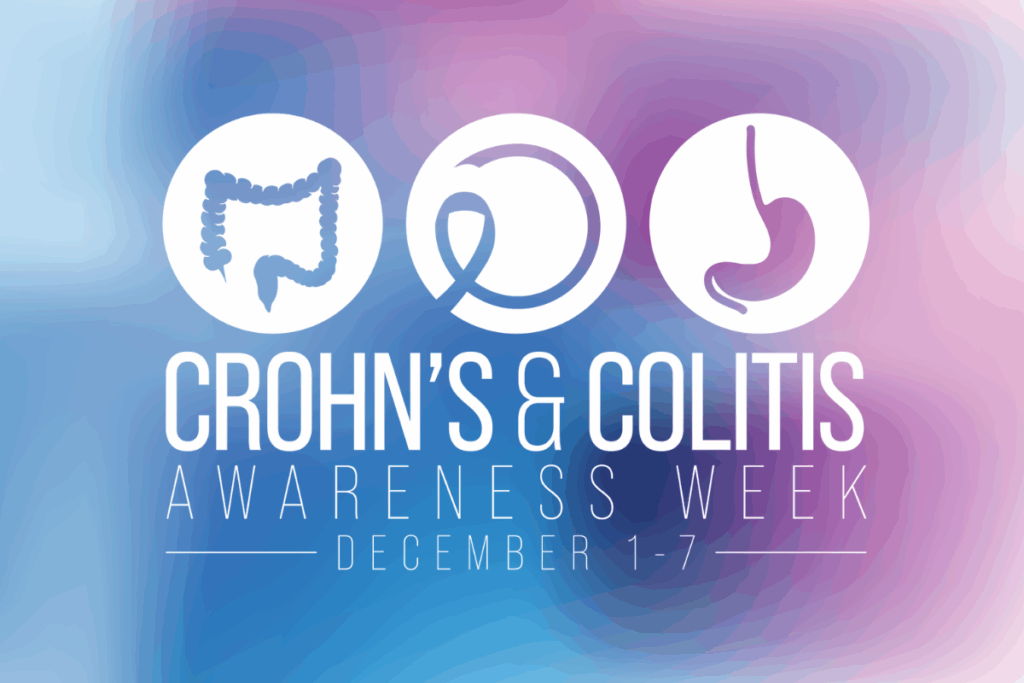
Crohn’s & Colitis Awareness Week takes place from December 1-7 each year, spotlighting the nearly 3 million Americans living with inflammatory bowel diseases (IBD), which include Crohn’s disease and ulcerative colitis. These chronic, lifelong conditions cause inflammation in the digestive tract, leading to symptoms that can significantly impact quality of life, including abdominal pain, diarrhea, fatigue, and weight loss.
Understanding IBD: The Impact of Crohn’s & Colitis
- Crohn’s Disease: This form of IBD can affect any part of the gastrointestinal tract, from mouth to anus, and may involve multiple layers of the bowel wall.
- Ulcerative Colitis: This condition specifically affects the large intestine (colon) and the rectum, causing inflammation and ulcers on the innermost lining of the colon.
While the exact cause of IBD is still unknown, it’s believed to involve a combination of genetic, environmental, and immune system factors. These diseases can vary widely from person to person, making treatment challenging and often requiring a combination of medication, lifestyle changes, and sometimes surgery.
Living with Crohn’s or colitis often means managing not only physical symptoms but also emotional and social challenges.
Ways to Get Involved
Educate Yourself: Learning more about Crohn’s disease and ulcerative colitis is the first step toward creating a supportive community.
- Join Awareness Campaigns: Use hashtags like #CCAwarenessWeek #CrohnsAndColitisAwareness and #IBDVisible to show support and help spread awareness on social media.

- Support IBD Organizations: Consider donating to or volunteering with groups like the Crohn’s & Colitis Foundation, which fund research, offer resources, and provide support networks for those living with IBD.
- Advocate for Better Access to Care: Support policies that improve access to treatment and mental health services for people with IBD, ensuring they have the resources needed to live healthier, more fulfilling lives.
Advancing Research and Innovation at WashU

Thanks to advancements in medical research, there are new and emerging treatments that help many people manage their IBD symptoms more effectively. However, there’s still much work to be done. Researchers at WashU Medicine Division of Gastroenterology are exploring better diagnostic tools, personalized treatment approaches, and potential therapies that can achieve long-term remission and, ultimately, a cure.
Kayci Huff, MD, PhD, Associate Professor of Medicine, was recognized as a “Catalyst for Mission Advancement” at the Crohn’s and Colitis Foundation Evening of Hope Gala. Parakkal Deepak MD, MS, FACG, Associate Professor of Medicine, Director of Clinical and Translational Research, received a $3M grant from the Helmsley Foundation to evaluate GLP-1A agonist in Crohn’s. Maté Gergely, MD, Assistant Professor of Medicine, is now offering Intestinal Ultrasound for point of care determination of IBD disease activity allowing decision-making to be made in office and reducing the need for more frequent colonoscopy or CT scans.
Here on the Department of Medicine website, Dr. Ciorba was recently featured as the leader of one of the nation’s leading IBD programs that provides expert clinical care, groundbreaking research, and innovative education.

The Washington University Department of Medicine’s Comprehensive IBD Center offers state-of-the-art care, providing patients with access to a multidisciplinary team, including dietitians, health psychologists, and dedicated nurse navigators.
Matthew Ciorba, MD
Professor of Medicine
Director, IBD Center
During Crohn’s & Colitis Awareness Week, let’s stand together to support individuals living with IBD, encourage understanding, and drive forward the search for better treatments. By raising awareness and advocating for change, we can help create a brighter future for those impacted by Crohn’s disease and ulcerative colitis.